1形容词变副词和练习
- 格式:doc
- 大小:30.50 KB
- 文档页数:3

形容词变副词的规则:1.一般情况下直接加“ly”,如quick---quickly,wise-wisely,polite -politely,nice-nicely,glad-gladly, 形容词变副词通常是加ly,其变化有规律可循,请记住以下口诀:一般直接加,“元e”去e加,“辅y”改i加,“le”结尾e改y。
以ll结尾的词只加y full-fully dull-dully分别举例如下:quick—quickly,true—truly,happy—happily, possible—possibly.Full-fully另外:一、在形容词词尾直接加-ly。
如:real-really; helpful-helpfully; careful-carefully;hopeful-hopefully; slow-slowly; quick-quickly; quiet-quietly二、以辅音字母加y结尾的形容词,如果读/i/要变y为i,然后再加-ly。
如:busy-busily; angry-angrily; easy-easily ,happy-happily, hungry-hungrily,如果读/ai/就直接加ly如shy-shyly dry-dryly sly-slyly三、某些以辅音字母加不发音的字母e如le结尾先去掉e,然后再加-y和以-ue结尾的形容词要先去掉e,-ly。
如元音字母加ly时直接加ly如sole-solely如: terrible-terribly; true-truly; simple, terrible, incredible,probable,gentle-gently另外,副词还可以由形容词加前缀a-得来,如:loud (adj.)-aloud (adv.)此外,部分名词加后缀也可变成副词,如:part-partly。
例句: It is partly her fault. 有部分是她的错。
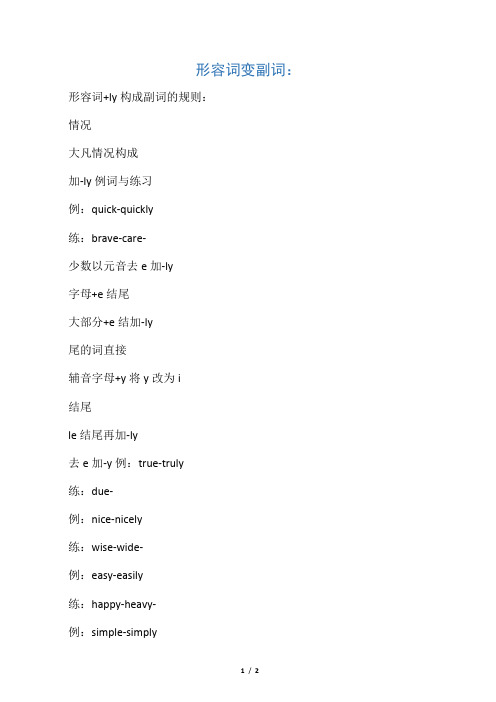
形容词变副词:形容词+ly构成副词的规则:情况大凡情况构成加-ly例词与练习例:quick-quickly练:brave-care-少数以元音去e加-ly字母+e结尾大部分+e结加-ly尾的词直接辅音字母+y将y改为i结尾le结尾再加-ly去e加-y例:true-truly练:due-例:nice-nicely练:wise-wide-例:easy-easily练:happy-heavy-例:simple-simply练:possible-comfortable-ll结尾只加-y例:full-fully练:dull-ic结尾的词(public-publicly例外)加-ally例:basic-basically练:scientific-automatic-不规则变化:1.本身既是形容词也是副词,无需改变:fast----fast,early----early,high----high,hard----hard,late----late,far----farwide----wide, alone----alone2.虽然以ly结尾,但却是形容词,不能直接用来修饰动词:friendly,lively,lovely,lonely,likely, motherly, manly等。
3.有些形容词本身即为副词,同时也有加-ly的副词形式。
但加不加ly意思不一样,使用时需注意,如:late(形容词,晚的)---late(副词,晚地),lately(最近)high(形容词,高的)--high(副词,高地),highly(副词,高度地,恨非常)。

形容词&副词一、形容词的定义✧表示人或事物的属性,特征或状态的词叫形容词Adjective.✧形容词修饰名词,为名词提供更多的信息,它分为性质形容词和叙述形容词两类.✧一般放在所修饰的名词之前;若修饰不定代词,则需后置.二、形容词的用法1. 用作定语 Li Mei is a beautiful city girl.2. 用作表语 My father's car is very expensive.3. 用作宾语补足语 Don't keep the door open.4. "the+形容词",表示一类人或事物,相当于名词,用作主语及宾语The old often think of old things. The new always take the place of the old.5.有时也可用作状语或补语 Please speak loud and clear.After seven days, the children came back from the forest safe.三、形容词的位置1.形容词一般放在名词前作定语a red flower一朵红花 this interesting story这个有趣的故事1当形容词所修饰的词是由some,any,every,no等构成的不定代词时,形容词必须置于所修饰的词之后.例如:She has something new to tell me. I have nothing important to do today. 2形容词后面有介词短语或不定式短语时,形容词必须置于名词之后.例如:It is a problem difficult to work out. Edison is a student difficult to teach. 3在以下特殊用法中,形容词置于所修饰的名词之后.例如:All people,young or old,should be strict with themselves.4有少数形容词,如enough和possible,既可置于所修饰的名词之前,也可置于所修饰的名词之后.例如:Do you have enough timetime enoughto prepare 你有足够的时间做准备吗5有些形容词,置于名词之前与之后,含义不尽相同.例如:the writer present 出席的作家 the present writer 当代的作家四、形容词的比较等级副词的比较级和最高级1.大多数以ly结尾的副词前加more 和most 来构成比较级和最高级;2.少数单音节副词,加er,est 构成其比较级和最高级 ;3. 几个特殊的形容词和副词1 句型"as…as",表示两者相比较,程度相同.The old man walks as fast as a young man.2 句型"not asso…as",表示两者相比较,前者不如后者.I'm not as tall as Jack. 我没有杰克高.3 表示两者之间比较时,用"形容词比较级+than"或"less…than"两种句型.Your mother looks healthier than before.4 more and more… 越来越…….The park is getting more and more beautiful.5 the 比较级…the比较级… 越……就越…….The more books we read, the cleverer we will become.6 "the+比较级+of the two…"两个中较……的一个.I'd like to go to the farther of the two places.7 "比较级+than any other+单数名词"比其他任何……都…….Li Lei is taller than any other boy in his class.8 三者或三者以上相比较,用"the+最高级+名词+范围"结构.This is the cleanest place of the city.9 表示"最……之一",用"one of the+形容词最高级+复数名词".The Great Wall of China is one of the greatest buildings in the world.注意: 形容词最高级前面必须加定冠词the,但当形容词最高级前面有物主代词修饰时,则不加the.例如:正This is my best friend.误 This is my thethe my best friend.五、几种常见的形容词句型1.形容词+介词+名词或代词或动名词I'm not interested in playing computer games.My parents are pleased with my studies.2.It iswas+形容词+of/for+名词或代词+不定式It's foolish of me to make such a mistake.It was kind of the driver to send the old man home.3.形容词+不定式常用于这种句型的形容词有:able,sure,lucky,ready,happy,likely等. She is sure to pass the exam. I'm lucky to meet you here.副词的用法1. 副词修饰动词,在句子中作方式状语;例如:The man runs fast. fast修饰runs这个动作2. 副词修饰形容词,并且通常放在形容词的前面例如:He becomes very handsome.3. 在“副词+形容词”这样的结构中,中心词是形容词,副词只是为了说明程度大小即:very handsome的中心词是handsome4. 副词前面也可以加副词,例如上面的句子都可以改写成:The man runs very fast.very本身是副词,意思是“非常,很”,所以后面也可以跟副词或者形容词;❖填形容词还是副词实义动词后面跟副词,连系动词后面跟形容词;例如:She sings beautifully. sing是实义动词,beautiful用来说明唱得如何She looks sad. look是连系动词,后面跟形容词还有一些不是连系动词的词,例如make和get,要根据句子的意思判断填形容词还是副词;区分:He is making a kite carefully.carefully用来修饰make这个动词He made the teacher angry.angry是指the teacher,而不是修饰make这个动词于是有词组:make sb+adj. leave sb+adj. get+adj❖形容词和副词分别长什么样子1.形容词的词尾通常有ing/ful/ed/yinteresting、tiring、boring、exciting、surprising、amazing与物有关interested、tired、bored、excited、surprised、amazed与人有关careful、hopeful、wonderful、helpful、colorful、meaningful、beautiful rainy、windy、cloudy、dry、messy、easy、funny、busy、angry区分:The children were excited when they heard the exciting news.The man was tired劳累的 after doing so many tiring累人的 jobs.但是在interesting与interested中,形容人或物的都用interesting,而interested 常以词组be interested in的形式出现,表示“对…感兴趣”;The story is interesting./The teacher is interesting.2.副词的词尾通常是ly,但亦有一些不以ly结尾的副词;badly、surprisingly、carefully、hopefully、quickly、greatly、possibly通常是由形容词加ly变来hard努力地、well好、high高、fast快地、pretty十分,非常、very much/a lot 非常a little一点3.有些词既是形容词也是副词hard adj.硬的 adv.努力地 early adj.早的 adv.早地 late adj.迟的adv.迟high adj.&adv. 高 well adj.健康地 adv.好形容词比较级练习题一写出下列形容词与副词的比较级与最高级形式:long wide fatheavy slow fewbrightly badly farquickly happy unhappy 二用所给词的正确形式填空:1. Of the two girls, I find Lucy the clever.2. Gold黄金 is little useful than iron铁.3. My sister is two years old than I.4. John’s parents have four daughters, and she is the young child.5. The cheap bags are the not usually the best ones.6. The short one is by far expensive of the five.7. The boy is not so interesting as his brother.8. Dick sings well, she sings well than John, but Mary singswell in her class.9. She will be much happy in her mew house.10. This dress is than that one.expensive三翻译句子:1.这本书跟那本书一样有趣;This book is _____ _____ that one.2.你游泳没有你弟弟好;You can’t swim _____ _____ your brother.3.今天比昨天冷的多;It is today ______ it was yesterday. 4.这个故事比另一个有趣得多;This story is _____ ______ than that one. 5.他比我大两岁;He is _____ ______ than I.6.这个故事不如那个有趣;This story is _____ _____ than that one. 7.她的身体状况一天天好起来;She is getting ______ every day.8.他对英语越来越感兴趣;He is becoming ______ _____ _______ _____ English.9.他吃的越多,人越胖;The more he eats, the _______ he gets.10.你的问题是两个中比较难的那个;Your question is _______ ______ of two.副词练习一、将形容词变为副词1.easy2.hard3.true4.heavy5.careful6.happy7.fast 8.lucky 9.gentle10.possible 11.angry 12.sad13.good 14.bad 15.near16.terrible17.quick 18.nice二、用单词适当形式填空1. Look at the children on the playground. They are flying kites ________happy.2. Why do you think you did so ___________badin your test3. We can __________easy forgive a child who is afraid of the dark, but we can’t forgive an adult who is afraid of the light.4. Congratulations You’ve answered all the questions _________correct.5. The computer is wideused in our daily life. We can do many things with it.6. I changed into my sports shoes so that I could walk more ____________comfortable.7. Mary passed her examination because she studied very ________hard.8. “Why didn’t you tell me earlier ” The boss shouted _______hungry.9. It’s true possible that robot teachers will be popular in schools some day.10. How _________comfortable the giant pandas are living in Taiwan11. Miss Xu smiled and said to me ________soft, “Never mind, my boy”12. Last night it rained __________heavy in the southern part of the city.13. Simon hates to be like others, he often tires to do everything different.14. The children clapped their hands _________excited as soon as the astronauts appearedon the stage.15. Tom had an accident yesterday. His teacher sent him to the hospital quick.形容词与副词专项训练练习题1. Work gets done ________ when people do it together, and the rewards are higher too.A. easilyB. very easyC. more easilyD. easier2. My parents have always made me ________ about myself, even when I was twelve.A. feeling wellB. feeling goodC. feel wellD. feel good3. He began to take political science ________ only when he left school.A. strictlyB. trulyC. carefullyD. seriously4. The final score of the basketball match was 93-94. We were only ________ beaten.A. nearlyB. slightlyC. narrowlyD. lightly5. The new group of students is better-behaved than the other group who stayed here ________.A. earlyB. earlierC. earliestD. the earliest6. —Do you need any help, Lucy —Yes, The job is ________ I could do myself.A. less thanB. more thanC. no more thanD. not more than7. There is an old proverb, ―Love me, love my dog. But there is ________ wisdomin this: ―Love me, love my book.A. someB. muchC. moreD. most8. With April 18’s railway speedup, highway and air transport will have to compete with ________ service for passengers.A. goodB. betterC. bestD. the best9. The melon the Smiths served at dinner would have tasted ________ if it had been put in the fridge for a little while.A. goodB. betterC. bestD. well10. After two years’ research, we now have a ________ better understanding of the disease.A. veryB. farC. fairlyD. quite11. Speaking of all the songs he has written, I think this is probably his ________ one.A. better-knownB. well-knownC. best-knownD. most-known12. Of the two coats, I’d choose the ________ one to spare some money for a book.A. cheapestB. cheaperC. more expensiveD. most expensive13. —I wonder why Mary is so unfriendly to us.—She is ________ than unfriendly, I’m afraid.A. shyerB. much shyerC. shy moreD. more shy14. —I didn’t do well in this English examination. How about you—I did ________ you.A. not better thanB. no worse thanC. as well asD. no better than15. —Now that you like the house with a garden, why not buy it—Well, I can’t afford ________ house at present.A. that expensive aB. a such expensiveC. that an expensiveD. a so expensive用所给词的适当形式填空1.The river was so polluted that it _________actual caught fire and burned.2.Bend your knees slightly and reach out your arms like tree branches, naturally and _______ soft.3.Just be ______________ patience.4.Although parents should take _________ well care of their young children, they don’t ______________ necessary do anything for them.5.---Do you like Mary’s new hairstyle---Perfect How much ________ good she looks with the curly short hair6.--- Are you satisfied with the result of the exam--- Not at all. I can’t have a ________ bad one.7.--- Lily did succeed at last--- Yeah, indeed, but she was _______________ luck than successful, I think.8.That would be a very _________ reason thing to do in a big city, but it could destroy a small village like this.9.Mary felt __________ please, because there were many empty seats in the room.10. The teachers are very enthusiastic and __________ friend and the classrooms are _____________ amaze.单句改错只有一处错误1.The fruits are small in size, but juicy and taste.2.We don’t need to do so many homework. Therefore, we have more time for after-school activities.3.The teachers here are kind and helpfully. They are not only our teachers but also our friends.4. That is too much for us, considering how closely the houses are.5.I’m always caution about what I say because some careless remarks are likely to hurt other’s feelings.6.Doing physical exercise is an effect way to get rid of anger.7.But such a small thing couldn’t possible destroy a village.8.Interesting, it has a connection with the British porcelain 瓷器 industry.1. C;根据题意可知,说话者是将when people do it together和when people don’t do it together这两种情况比较,故选比较级;注意不要选D,因为在此题是要用副词修饰动词,不能用形容词;另外,根据句末的higher too也可知道此题是考查比较级;2. D;首先,根据连系动词后要接形容词作表语这一特点,可排除A和C;另外,使役动词make后可接动词原形不带to的不定式或过去分词作宾语补足语,但不能接现在分词,故可排除选项B;3. D;take sth seriously的意思是“认真对待某事”“认真考虑某事”;4. C;副词narrowly 在此表示“勉强地”,又如:He narrowly escaped being run over. 他差点儿被车压死; The proposal to change the rules was narrowly defeated by 201 votes to 196. 建议改变规则的提议以196票对201票的微弱差额被否决了;本题句意:篮球赛的最后比分是93比94;我们以微弱的劣势输掉了比赛;5. B;因题目把这组新学生与前面一组学生进行比较,故用比较级;6. B;注意句中的Yes,由于答话者对问话者的“你需要帮助吗”作了肯定回答,说明答话者独自完成工作有困难,故填more than;7. C;由于是将“Love me, love my dog”与“Love me, love my book”进行比较,故用比较级;此题的巧妙之处在于句中没有出现than,而是给出两个待比较的proverb; 8. B;句子大意为:由于铁路提速了,所以高速公路和航空业要提高服务质量来竞争客源;因将“高速公路和航空”与“铁路”比较,故用比较级; 9. B;题目中将“放入冰箱中冷冻”与“不放入冰箱中冷冻”作比较,故用比较级;句意为:史密斯家人晚餐时上的甜瓜若能放入冰箱中冷冻一下味道会更好些; 10. B;这四个副词中,通常只有far可用于修饰比较;注:quite有时也可用于修饰比较better,但它只用于表示“身体康复”,不用于其他意义; 11. C;因为是从他所写的所有歌中选出一首来比较,故用最高级from .hxen; 12. B;因是两者比较,故用比较级,可将答案锁定在B和C之间;再根据句意,排除C; 13. D;此题考查more…than…的用法,其意为“与其说……不如说……”; 14. D;句中的no better than相当于as badly as,其意为“一样不好”; 15.A;that在用作副词,用法相当于so,意为“如此,这么”;Ⅰ 1. actually 2. softly 3. patient 4. good, necessarily 5. better 6. worse 7. more lucky 8. reasonable 9. pleased 10. friendly, amazingⅡ1. taste---tasty 2. many----much 3. helpfully---helpful 4. closely --- close 5. caution---cautious6. effect---effective7. possible ---possibly8. Interesting---Interestingly9. more---manylonger longest wider widest fatter fattestheavier heaviest slow slower slowest fewer fewestmore brightly most brightly more badly most badlyfarther farthest more quickly most quickly happier happiest unhappier unhappiest二用所给词的正确形式填空:1. cleverer2.less3.older4.youngest5.cheapest6.more7.interesting8.well,better ,best 9. Happier 10. more expensive三翻译句子:1. as interesting as2. As well as3.much colder today than4. Much more interesting 5.two years older 6. Not more interesting 7. Getting better and better 8.more and more interested in 9. Fatter10. The more difficult形容词&副词一、形容词的定义✧表示人或事物的属性,特征或状态的词叫形容词Adjective.✧形容词修饰名词,为名词提供更多的信息,它分为性质形容词和叙述形容词两类.✧一般放在所修饰的名词之前;若修饰不定代词,则需后置.二、形容词的用法1. 用作 Li Mei is a beautiful city girl.2. 用作 My father's car is very expensive.3. 用作 Don't keep the door open.4. " ",表示一类人或事物,相当于名词,用作主语及宾语The old often think of old things. The new always take the place of the old.5.有时也可用作 Please speak loud and clear.After seven days, the children came back from the forest safe.三、形容词的位置1.形容词一般放在名词前作定语a red flower一朵红花 this interesting story这个有趣的故事1当形容词所修饰的词是由some,any,every,no等构成的时,形容词必须置于所修饰的词之后.例如:She has something new to tell me. I have nothing important to do today. 2形容词后面有介词短语或不定式短语时,形容词必须置于名词之后.例如:It is a problem difficult to work out. Edison is a student difficult to teach. 3在以下特殊用法中,形容词置于所修饰的名词之后.例如:All people,young or old,should be strict with themselves.4有少数形容词,如和 ,既可置于所修饰的名词之前,也可置于所修饰的名词之后.例如:Do you have enough timetime enoughto prepare 你有足够的时间做准备吗5有些形容词,置于名词之前与之后,含义不尽相同.例如:the writer present 的作家 the present writer 的作家四、形容词的比较等级☆副词的比较级和最高级1.大多数以ly结尾的副词前加和来构成比较级和最高级;2.少数单音节副词,加er,est 构成其比较级和最高级 ;比较级和最高级的常用句型1 句型" ",表示两者相比较,程度相同.The old man walks as fast as a young man.2 句型" ",表示两者相比较,前者不如后者.I'm not as tall as Jack. 我没有杰克高.3 表示两者之间比较时,用" "或" "两种句型.Your mother looks healthier than before.4 越来越…….The park is getting more and more beautiful.5 越……就越…….The more books we read, the cleverer we will become.6 " "两个中较……的一个.I'd like to go to the farther of the two places.7 " "比其他任何……都…….Li Lei is taller than any other boy in his class.8 三者或三者以上相比较,用" "结构.This is the cleanest place of the city.9 表示"最……之一",用" ".The Great Wall of China is one of the greatest buildings in the world.注意: 形容词最高级前面必须加定冠词the,但当形容词最高级前面有物主代词修饰时,则不加the.例如:正This is my best friend.误 This is my thethe my best friend.五、几种常见的形容词句型1.I'm not interested in playing computer games.My parents are pleased with my studies.2.It's foolish of me to make such a mistake.It was kind of the driver to send the old man home.3.常用于这种句型的形容词有:able,sure,lucky,ready,happy,likely等.She is sure to pass the exam. I'm lucky to meet you here.☆☆副词的用法1. 副词修饰 ,在句子中作方式状语;例如:The man runs fast. fast修饰runs这个动作2. 副词修饰 ,并且通常放在形容词的前面例如:He becomes very handsome.3. 在“副词+形容词”这样的结构中,中心词是形容词,副词只是为了说明程度大小即:very handsome的中心词是handsome4. 副词前面也可以加 ,例如上面的句子都可以改写成:The man runs very fast.very本身是副词,意思是“非常,很”,所以后面也可以跟副词或者形容词;❖填形容词还是副词实义动词后面跟 ,连系动词后面跟 ;例如:She sings beautifully. sing是实义动词,beautiful用来说明唱得如何She looks sad. look是连系动词,后面跟形容词还有一些不是连系动词的词,例如make和get,要根据句子的意思判断填形容词还是副词;区分:He is making a kite carefully/ careful.He made the teacher angry/ angrily于是有词组:make sb+adj. leave sb+adj. get+adj❖形容词和副词分别长什么样子1. 形容词的词尾通常有interesting、tiring、boring、exciting、surprising、amazing与物有关interested、tired、bored、excited、surprised、amazed与人有关careful、hopeful、wonderful、helpful、colorful、meaningful、beautifulrainy、windy、cloudy、dry、messy、easy、funny、busy、angry区分:The children were excited when they heard the exciting news.The man was tired/ tiring 劳累的 after doing so many tired/ tiring累人的 jobs.✧但是在interesting与interested中,形容人或物的都用interesting✧而interested常以词组be interested 的形式出现,表示“对…感兴趣”;The story is interesting./The teacher is interesting.2. 副词的词尾通常是ly,但亦有一些不以ly结尾的副词;努力地、好、高、快地、十分,非常、一点4.有些词既是形容词也是副词adj.硬的 adv.努力地 adj.早的 adv.早地 adj.迟的adv.迟adj.&adv. 高 adj.健康地 adv.好。
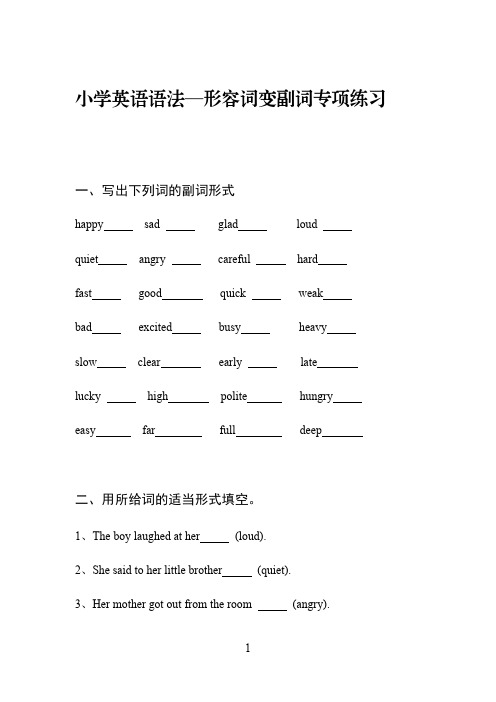
小学英语语法—形容词变副词专项练习一、写出下列词的副词形式happy sad glad loudquiet angry careful hardfast good quick weakbad excited busy heavyslow clear early latelucky high polite hungryeasy far full deep二、用所给词的适当形式填空。
1、The boy laughed at her (loud).2、She said to her little brother (quiet).3、Her mother got out from the room (angry).4、“Thank you!” said the lion (happy).5、The mouse walk past the room (careful).6、Sam was (angry) and he hit the ball (hard).7、He opened the present (slow).8、Tim got hurt and he cried (sad) on the floor.9、Jack is running (fast) in the playground.10、The man was tired, he walked (slow) on the pavement.11、He is very (hungry) and can not run (fast).12、The children are talking about their hobbies (excited).13、Please look at the blackboard (careful).14、Be (careful)! There is a car running to you (quick).15、The woman is shouting at her son (loud).16、Listen! The birds are singing songs (happy).17、Lily is a (quiet) girl, she is reading (quiet).18、Listen (care)! The teacher is looking at you.19、The hole is too (deep) , Sam can not reach it.20、He brings some water (quick) and pours it into the hole.21、I can play table tennis very (good).22、She is a (good) swimmer and she can swim (good).23、You should study (hard) in the school.24、My grandmother told us a (sad) story, all of us are (sad).25、“ Please don’t eat me!” said the mouse (quiet).26、All of the students cheered for them (loud).27、I usually get up (early) in the morning.28、“Don’t go to school (late)!” said her mother (loud).29、She finishes her homewok (easy).30、She’s (luck). Her kite flies (high) in the sky.。

形容词变副词练习题在英语中,形容词(adjective)是用来修饰名词的词语,而副词(adverb)则是用来修饰动词、形容词、或其他副词的词语。
形容词变副词的规则多种多样,有些形容词只需加上 -ly 后缀,有些需要改变拼写,还有些则是完全不规则的变化。
下面是一些形容词变副词的练习题,帮助你熟悉这些规则。
1. 完成下面形容词变副词的练习:a) quick -b) careful -c) easy -d) frequent -e) happy -2. 将下面的形容词变成副词,并使用正确的形式填入句子中:a) She danced _______ in the ballet. (graceful)b) The child spoke _______ to his mother. (angry)c) He plays the guitar _______. (beautiful)d) The athletes ran _______ in the race. (fast)e) He sang _______ during the performance. (beautiful)3. 句子改正:对下面的句子中错误使用的副词进行纠正。
a) She sings goodly.b) The student studied hardly for the exam.c) I am real happy to see you.d) They walked quick down the street.e) The car drives bad.4. 选择适当的副词填入句子中。
a) She swam _______ in the pool. (quickly / quick)b) The dog barked _______ at the stranger. (fierce / fiercely)c) They waited _______ for the bus to arrive. (patient / patiently)d) The flowers smell _______. (sweet / sweetly)e) He worked _______ to finish the project. (hard / hardly)5. 将下面的副词改写为对应的形容词,并填入句子中。
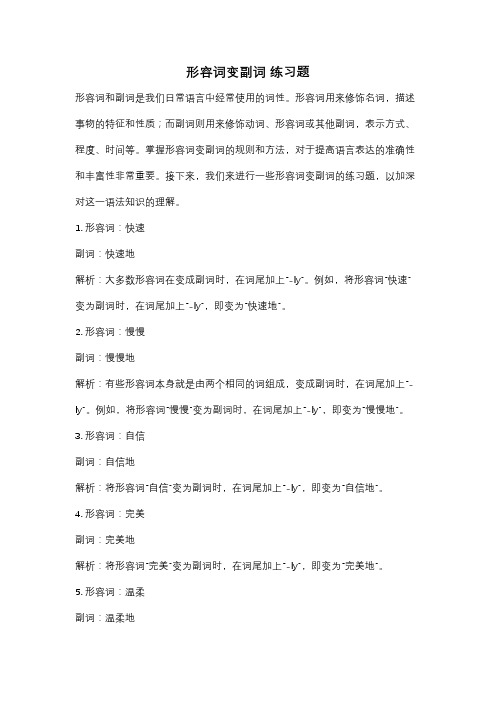
形容词变副词练习题形容词和副词是我们日常语言中经常使用的词性。
形容词用来修饰名词,描述事物的特征和性质;而副词则用来修饰动词、形容词或其他副词,表示方式、程度、时间等。
掌握形容词变副词的规则和方法,对于提高语言表达的准确性和丰富性非常重要。
接下来,我们来进行一些形容词变副词的练习题,以加深对这一语法知识的理解。
1. 形容词:快速副词:快速地解析:大多数形容词在变成副词时,在词尾加上“-ly”。
例如,将形容词“快速”变为副词时,在词尾加上“-ly”,即变为“快速地”。
2. 形容词:慢慢副词:慢慢地解析:有些形容词本身就是由两个相同的词组成,变成副词时,在词尾加上“-ly”。
例如,将形容词“慢慢”变为副词时,在词尾加上“-ly”,即变为“慢慢地”。
3. 形容词:自信副词:自信地解析:将形容词“自信”变为副词时,在词尾加上“-ly”,即变为“自信地”。
4. 形容词:完美副词:完美地解析:将形容词“完美”变为副词时,在词尾加上“-ly”,即变为“完美地”。
5. 形容词:温柔副词:温柔地解析:将形容词“温柔”变为副词时,在词尾加上“-ly”,即变为“温柔地”。
6. 形容词:快乐副词:快乐地解析:将形容词“快乐”变为副词时,在词尾加上“-ly”,即变为“快乐地”。
7. 形容词:明亮副词:明亮地解析:将形容词“明亮”变为副词时,在词尾加上“-ly”,即变为“明亮地”。
8. 形容词:高兴副词:高兴地解析:将形容词“高兴”变为副词时,在词尾加上“-ly”,即变为“高兴地”。
9. 形容词:清晰副词:清晰地解析:将形容词“清晰”变为副词时,在词尾加上“-ly”,即变为“清晰地”。
10. 形容词:轻松副词:轻松地解析:将形容词“轻松”变为副词时,在词尾加上“-l y”,即变为“轻松地”。
通过以上的练习题,我们可以看到形容词变副词的规则大致相同,即在形容词的词尾加上“-ly”。
然而,也有一些例外情况,例如“good”变为“well”,“fast”变为“fast”,“hard”变为“hard”等。
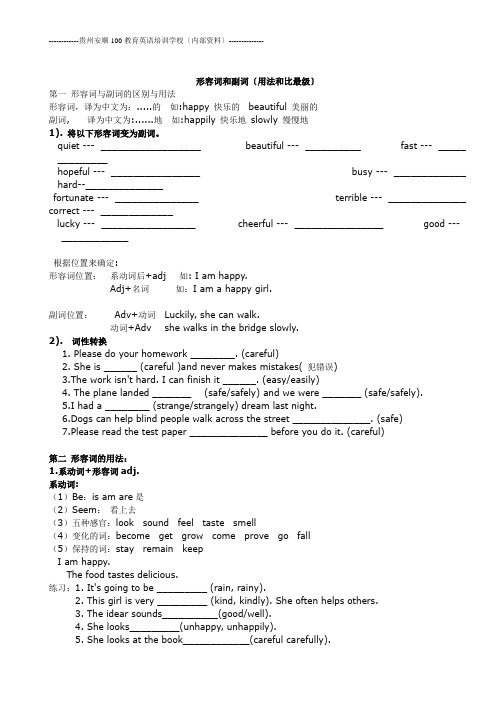
形容词和副词〔用法和比最级〕第一形容词与副词的区别与用法形容词,译为中文为:.....的如:happy 快乐的beautiful 美丽的副词, 译为中文为:......地如:happily 快乐地slowly 慢慢地1). 将以下形容词变为副词。
quiet --- __________________ beautiful --- __________ fast --- _____ _________hopeful --- ________________ busy --- _____________ hard--______________fortunate --- _______________ terrible --- ______________ correct --- _____________lucky --- _________________ cheerful --- ________________ good --- ____________根据位置来确定:形容词位置:系动词后+adj 如: I am happy.Adj+名词如:I am a happy girl.副词位置:Adv+动词Luckily, she can walk.动词+Adv she walks in the bridge slowly.2). 词性转换1. Please do your homework ________. (careful)2. She is ______ (careful )and never makes mistakes( 犯错误)3.The work isn't hard. I can finish it ______. (easy/easily)4. The plane landed _______ (safe/safely) and we were _______ (safe/safely).5.I had a ________ (strange/strangely) dream last night.6.Dogs can help blind people walk across the street ______________. (safe)7.Please read the test paper ______________ before you do it. (careful)第二形容词的用法:1.系动词+形容词adj.系动词:(1)Be:is am are是(2)Seem:看上去(3)五种感官:look sound feel taste smell(4)变化的词:become get grow come prove go fall(5)保持的词:stay remain keepI am happy.The food tastes delicious.练习:1. It's going to be _________ (rain, rainy).2. This girl is very _________ (kind, kindly). She often helps others.3. The idear sounds__________(good/well).4. She looks_________(unhappy, unhappily).5. She looks at the book____________(careful carefully).2、Adj+名词--------------大多数形容词作定语修饰名词时放在名词前,说明名词的品质或特征。

形容词变副词和练习 Document number【980KGB-6898YT-769T8CB-246UT-18GG08】形容词变副词规律和练习1.大部分形容词加ly变成副词careful----carefully careless----carelessly quick---quicklyquiet----quietly different----differently successful--- successfully2.不用去掉字母e:polite--politely safe—safely wide--widely, wise(聪明的/明智的)--wisely (聪明地/明智地)注意:唯一一个去e: true----truly(真的没e)3. .以le结尾的形容词变le为lypossible----possibly comfortable----comfortably terrible----terribly4.以y结尾的形容词变y为i加lyeasy----easily angry----angrily noisy----noisilyhappy----happily heavy----heavily healthy----healthily5. 本身既是形容词也是副词,无需改变fast----fast early----early hard----hard late----late far----far 6. 虽然以ly结尾,但却是形容词,不能用来修饰动词friendly lively:活泼的,生动的 lovely:可爱的, lonely:孤独的7. 形容词和副词为完全不同的单词好:good----well(形容词,宽阔的)-----widely(副词,广泛地)9. hard:①形容词:硬的,难的②副词:努力地;hardly:“几乎不”(与hard毫无关系)10. weekly:①.形容词:每周的②副词:每周地daily:①.形容词:每日的②副词:每日地alone:①形容词:独自,一个人的②副词:独自地lonely: 形容词:孤独的练习1.Look at the children on the playground. They are flyingkites___________(愉快). Let’s join them.2.Why do you think you did so ____________(糟糕) in your test3.We can __________(容易) forgive(原谅) a child who is afraid of thedark, but we can’t forgive an adult() who is afraid of the light.4.Congratulations! You’ve answered all the Questions_____________(correct)5.The computer is __________(广泛) used in our daily life.6.I changed into my sports shoes so that I could walk more___________(comfortable).7.Mary passed her examination because she studied very __________(hard).8.“Why didn’t you tell me earlier” The boss shouted ___________(生气)9.It’s ________(true) possible that robot teachers will be popular inschools some day.(comfortable) the giant pandas are living in Taiwan.Xu smiled and said to me _____(soft),“ Never mind ,my boy!”night rained ______ /______(大) in the southern part of the city.children clapped their hands__________(兴奋) as soon as the astronauts appeared on the stage.had an accident yesterday. His teacher sent him to the hospital _________(快).15We should speak to the old man __________(polite).’m________(true) sorry I can’t go with you. I have a lot to do this afternoon.17. His father was running to his home________(饿) because he didn’thave meals today.walked__________(quiet) into the room not to wake up his grandpa. (quick) Betty answered the teacher’s question!20. The foremen have saved the boy from thefire____________(successful).hates to be like others, he often tries to do everything___________(不同).22. Does your father walk _________ up with youA. fast enough to catchB. enough fast catchingC. enough fast to catchD. fast enough catchingwas the weather yesterday --It was terrible. It rained _______all day.A. stronglyB. heavilyC. hardlyD. badly24. People in different countries behave()______ when they eatdinner.A. politelyB. differentlyC. healthilyD. quietlythe physics problem _______---Yes. I can work it out _______.A. easy; easilyB. easy; easyC. easily; easyD. easily; easierbusier he is, the _____ he feels.A. happilyB. happyC. happierD. more happy27. Her mother was out. She stayed at home_______, but she didn't feel_______.A. alone, lonelyB. lonely lonelyC. alone, aloneD. lonely,alone28. I got up______today. A. later B. more lately C. lately D.late29. What a ___ cough! You seen ___ill.A. terrible, terriblyB. terribly, terribleC. terrible, terribleD. terribly, terribly30. —What was the weather like yesterday—It was very bad. It rained ______ people could _______ go out.A. hard, hardB. hardly, hardC. hardly, hardlyD. hard, hardly31. Alice_______goes to school at seven. A. usual B. usually C. hardD. a little32. You must wear glasses. They can keep your eyes___.A. softB. safeC. safelyD. safety33. Would you please speak_______ I still can't follow you.A. slowB. much slowC. much slowlyD. more slowly34. These oranges taste________. A. good B. well C. to be good D.to be well’t feel_________(worry) about your child. The whole class would be_________ (friend) to the new classmate.36.The children in China are living a __________ (color) life.37.The night was very ___, so he had to take off his shoes ___.A. quiet; quietlyB. quite; quicklyC. late; quickD. quite;quietly38.He____ to school to clean his classroom.A. always comes earlyB. comes always earlyC. always early comesD. come always earlier。

请将下列形容词变为副词:1.possible--(adv)______________2. terrible--(adv)_____________3. comfortable-- (adv) _________4.gentle--(adv) _____________5. simple-- (adv) _____________6.easy--(adv) ______________7.angry-- (adv) ______________8. noisy--(adv) ______________9.happy-- (adv) ______________ 10.heavy-- (adv) _____________ 11.healthy--(adv) ____________ 12. shy-- (adv) ______________ 13.dry--(adv) ______________ 14.good--(adv) ______________ 15.true--(adv) ______________ 16. polite-- (adv) _____________ 17.nice-- (adv) ______________ 18. wise--(adv) ______________ 19.basic-- (adv) _____________ 20.scientific--(adv) ___________ 21.public--(adv) ______________ 22.sad--(adv) ______________答案:1. possibly 2. terribly 3. comfortably 4. gently 5. simply 6. easily 7. angrily 8. noisily 9. happily 10. heavily 11. healthily12.shyly 13. dryly 14. well 15. truly 16. politely 17. nicely18. wisely 19. basically 20. scientifically; 21. publicly 22. sadly写出下列形容词副词的比较级和最高级:1. tall_________ __________2. fast_________ __________rge_________ __________4.nice _________ __________5. busy_________ __________6. early_________ __________7.hot _________ __________ 8. big_________ __________9.delicious_________ __________ 10.beautiful_________ __________ 11. good (well) _________ __________12.bad (badly) _________ __________ 13. far_________ __________ 14. much/many_________ __________ 15. little_________ __________ 16. few_________ __________17.easy_________ __________ 18.pretty_________ __________19.happy_________ __________ 20.funny_________ __________21.slim _________ __________ 22.thin_________ __________23. old_________ __________答案:1. tall—taller—tallest2.fast—faster—fastestrge—larger—largest4.nice—nicer—nicest5. busy—busier—busiest6. early—earlier—earliest7.hot—hotter—hottest 8. big—bigger—biggest9.delicious—more delicious—most delicious10.beautiful—more beautiful—most beautiful11. good (well)—better—best 12.bad (badly)—worse—worst13. far—farther/further—farthest /furthest 14. much/many—more – most15. little-- less—least 16. few—fewer--fewest17.easy—easier—easiest 18.pretty--prettier--prettiest19.happy—happier—happiest20.funny—funnier--funniest21.slim—slimmer—slimmest 22.thin—thinner—thinnest23. old—older/elder—oldest / eldest(注:文档可能无法思考全面,请浏览后下载,供参考。
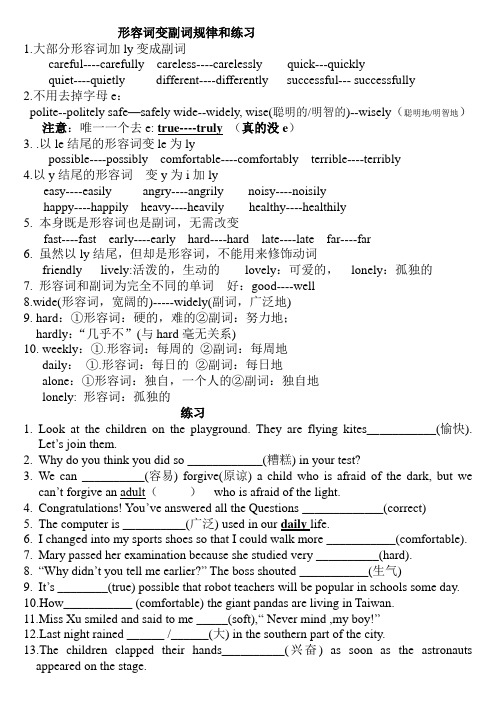
形容词变副词规律和练习1.大部分形容词加ly变成副词careful----carefully careless----carelessly quick---quicklyquiet----quietly different----differently successful--- successfully2.不用去掉字母e:polite--politely safe—safely wide--widely, wise(聪明的/明智的)--wisely(聪明地/明智地)注意:唯一一个去e: true----truly(真的没e)3. .以le结尾的形容词变le为lypossible----possibly comfortable----comfortably terrible----terribly4.以y结尾的形容词变y为i加lyeasy----easily angry----angrily noisy----noisilyhappy----happily heavy----heavily healthy----healthily5. 本身既是形容词也是副词,无需改变fast----fast early----early hard----hard late----late far----far6. 虽然以ly结尾,但却是形容词,不能用来修饰动词friendly lively:活泼的,生动的lovely:可爱的,lonely:孤独的7. 形容词和副词为完全不同的单词好:good----well8.wide(形容词,宽阔的)-----widely(副词,广泛地)9. hard:①形容词:硬的,难的②副词:努力地;hardly:“几乎不”(与hard毫无关系)10. weekly:①.形容词:每周的②副词:每周地daily:①.形容词:每日的②副词:每日地alone:①形容词:独自,一个人的②副词:独自地lonely: 形容词:孤独的练习1.Look at the children on the playground. They are flying kites___________(愉快).Let’s join them.2.Why do you think you did so ____________(糟糕) in your test?3.We can __________(容易) forgive(原谅) a child who is afraid of the dark, but wecan’t forgive an adult()who is afraid of the light.4.Congratulations! You’ve answered all the Questions _____________(correct)5.The computer is __________(广泛) used in our daily life.6.I changed into my sports shoes so that I could walk more ___________(comfortable).7.Mary passed her examination because she studied very __________(hard).8.“Why didn’t you tell me earlier?” The boss shouted ___________(生气)9.It’s ________(true) possible that robot teachers will be popular in schools some day.10.How___________ (comfortable) the giant pandas are living in Taiwan.11.Miss Xu smiled and said to me _____(soft),“ Never mind ,my boy!”st night rained ______ /______(大) in the southern part of the city.13.The children clapped their hands__________(兴奋) as soon as the astronauts appeared on the stage.14.Tom had an accident yesterday. His teacher sent him to the hospital _________(快). 15We should speak to the old man __________(polite).16.I’m________(true) sorry I can’t go with you. I have a lot to do this afternoon.17. His father was running to his home________(饿) because he didn’t have meals today.18.Mike walked__________(quiet) into the room not to wake up his grandpa.19.How_________(quick) Betty answered the teacher’s question!20. The foremen have saved the boy from the fire____________(successful).21.Simon hates to be like others, he often tries to do everything___________(不同).22. Does your father walk _________ up with you?A. fast enough to catchB. enough fast catchingC. enough fast to catchD. fast enough catching23.--How was the weather yesterday? --It was terrible. It rained _______all day.A. stronglyB. heavilyC. hardlyD. badly24. People in different countries behave()______ when they eat dinner.A. politelyB. differentlyC. healthilyD. quietly25.---Is the physics problem _______?---Yes. I can work it out _______.A. easy; easilyB. easy; easyC. easily; easyD. easily; easier26.The busier he is, the _____ he feels.A. happilyB. happyC. happierD. more happy27. Her mother was out. She stayed at home_______, but she didn't feel _______.A. alone, lonelyB. lonely lonelyC. alone, aloneD. lonely, alone28. I got up______today. A. later B. more lately C. lately D. late29. What a ___ cough! You seen ___ill.A. terrible, terriblyB. terribly, terribleC. terrible, terribleD. terribly, terribly30. —What was the weather like yesterday?—It was very bad. It rained ______ people could _______ go out.A. hard, hardB. hardly, hardC. hardly, hardlyD. hard, hardly31. Alice_______goes to school at seven. A. usual B. usually C. hard D. a little32. You must wear glasses. They can keep your eyes___.A. softB. safeC. safelyD. safety33. Would you please speak_______? I still can't follow you.A. slowB. much slowC. much slowlyD. more slowly34. These oranges taste________. A. good B. well C. to be good D. to be well35.Don’t feel_________(worry) about your child. The whole class would be_________ (friend) to the new classmate.36.The children in China are living a __________ (color) life.37.The night was very ___, so he had to take off his shoes ___.A. quiet; quietlyB. quite; quicklyC. late; quickD. quite; quietly38.He____ to school to clean his classroom.A. always comes earlyB. comes always earlyC. always early comesD. come always earlier。

小学英语语法一形容词变副词专项练习一、选择合适的词填空。
1. The car is driving (slow, slowly).2. The student answered the question (correct, correctly).3. The dog barked (loud, loudly).4. She sings (beautiful, beautifully).5. The baby slept (peaceful, peacefully).6. The boy ran (fast, fastly).7. The flowers smell (sweet, sweetly).8. The bird flew (high, highly).9. The cake tastes (delicious, deliciously).10. The teacher spoke (clear, clearly).二、根据句意填入正确的副词。
1. The turtle moves _________. (slow)2. I can hear you __________. (clear)3. She sings ____________. (beautiful)4. The rain fell ___________. (heavy)5. The baby slept __________. (peaceful)6. The children played __________. (noisy)7. The bird flies ___________. (high)8. The flowers smell ____________. (sweet)9. The boy runs ___________. (fast)10. The cake tastes ___________. (delicious)一、用形容词的正确形式填空。
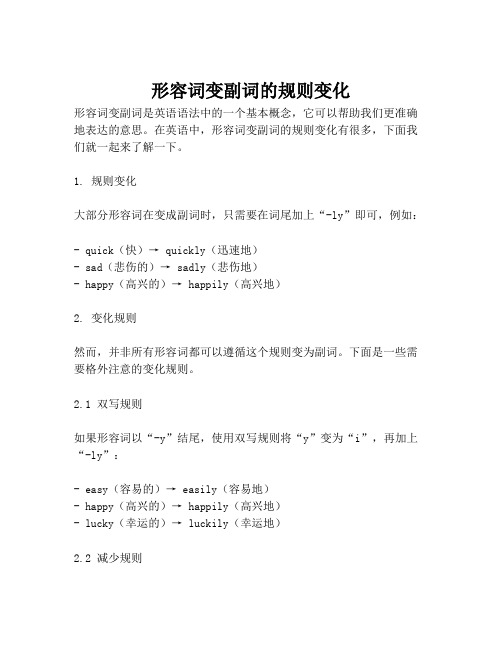
形容词变副词的规则变化形容词变副词是英语语法中的一个基本概念,它可以帮助我们更准确地表达的意思。
在英语中,形容词变副词的规则变化有很多,下面我们就一起来了解一下。
1. 规则变化大部分形容词在变成副词时,只需要在词尾加上“-ly”即可,例如:- quick(快)→ quickly(迅速地)- sad(悲伤的)→ sadly(悲伤地)- happy(高兴的)→ happily(高兴地)2. 变化规则然而,并非所有形容词都可以遵循这个规则变为副词。
下面是一些需要格外注意的变化规则。
2.1 双写规则如果形容词以“-y”结尾,使用双写规则将“y”变为“i”,再加上“-ly”:- easy(容易的)→ easily(容易地)- happy(高兴的)→ happily(高兴地)- lucky(幸运的)→ luckily(幸运地)2.2 减少规则如果形容词以“-le”结尾,将“-le”改为“-ly”:- terrible(可怕的)→ terribly(可怕地)- possible(可能的)→ possibly(可能地)- probable(可能的)→ probabl y(可能地)2.3 不规则变化有一些形容词副词变化规则非常规,需要记忆:- good(好的)→ well(好地)- fast(快的)→ fast(快地)- hard(难的)→ hard(努力地)3. 注意点在使用形容词转化为副词时,有一些需要注意的点:- 在正式场合,应该使用形容词的词根,再加上“-ly”,以避免语法错误。
- 在不同的情境下,形容词的副词形式可能会有所不同。
例如,形容词“high”在描述音乐时变为“loudly”,在描述气球时变为“highly”。
- 不要将动词、名词和形容词混淆。
如果您使用了一个错误的形容词副词形式,可能会改变句子的含义或造成语法错误。
总之,形容词变副词是英语语法中非常基础和重要的概念。
只有通过不断地练习,才能更好地掌握规则和注意点。

形容词副词讲义与练习(一)(含答案)一、形容词用法〔1〕形容词通常用于名词的前面。
意为“……的〞。
例如a nice box 一只美丽的箱子an empty cup 一个空杯子a clever boy 一个聪慧的男孩 a beautiful girl 一个美丽的女孩an interesting story 一个好玩的故事 a blue car 一辆蓝色的小汽车(2)系动词后加形容词: bee (变得);get (变得);go (变得);turn (变得); keep (保持)。
feel (感觉);look (看上去);sound (听起来); smell (闻起来);taste (尝起来);“五感四变一保持”(要默熟)【例句】He is smart. 他很机智。
It’s cold in winter. 冬季,天很冷。
You look fine. 你们看上去很好。
二、副词用法1. 修饰动词:Wang Lin smiles happily.王林欢乐地笑着。
2. 修饰形容词、副词:Xiaoming is really happy. 小明真地很快乐。
3. 表示事情发生的频率:always, usually, often, sometimes, hardly, neverHe always gets to school before me. 他总是在我之前到达学校。
【例句】We live happily. (happily欢乐地,幸福地,修饰动词live)The students are listening to the teacher carefully. (carefully 仔细地,修饰动词listen)Don’t speak loudly in class. (loudly 大声地,修饰动词speak)三、形容词变副词规则(1)直接加ly。
如:realreally; helpfulhelpfully; carefulcarefully;(2)以辅音字母加y结尾的形容词要变y为i,再加ly。

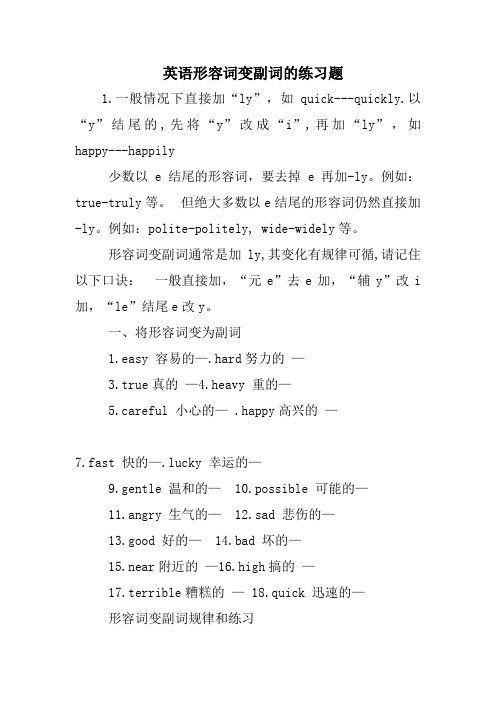
英语形容词变副词的练习题1.一般情况下直接加“ly”,如quick---quickly.以“y”结尾的,先将“y”改成“i”,再加“ly”,如happy---happily少数以e结尾的形容词,要去掉e再加-ly。
例如:true-truly等。
但绝大多数以e结尾的形容词仍然直接加-ly。
例如:polite-politely, wide-widely等。
形容词变副词通常是加ly,其变化有规律可循,请记住以下口诀:一般直接加,“元e”去e加,“辅y”改i 加,“le”结尾e改y。
一、将形容词变为副词1.easy 容易的—.hard努力的—3.true真的—4.heavy 重的—5.careful 小心的— .happy高兴的—7.fast 快的—.lucky 幸运的—9.gentle 温和的— 10.possible 可能的—11.angry 生气的— 12.sad 悲伤的—13.good 好的— 14.bad 坏的—15.near附近的—16.high搞的—17.terrible糟糕的— 18.quick 迅速的—形容词变副词规律和练习1.大部分形容词加ly变成副词careful----carefully careless----carelessly quick---quicklyquiet----quietlydifferent----differentlysuccessful--- successfully2.不用去掉字母e:polite--politely safe—safely wide--widely, wise--wisely注意:唯一一个去e: true----truly3. .以le结尾的形容词变le为lypossible----possiblycomfortable----comfortably terrible----terribly4.以y结尾的形容词变y为i加lyeasy----easily angry----angrily noisy----noisilyhappy----happily heavy----heavily healthy----healthily5. 本身既是形容词也是副词,无需改变fast----fast early----early hard----hard late----late far----far6. 虽然以ly结尾,但却是形容词,不能用来修饰动词friendlylively:活泼的,生动的 lovely:可爱的,lonely:孤独的7. 形容词和副词为完全不同的单词好:good----well8.wide-----widely9. hard:①形容词:硬的,难的②副词:努力地;hardly:“几乎不”10. weekly:①.形容词:每周的②副词:每周地daily:①.形容词:每日的②副词:每日地alone:①形容词:独自,一个人的②副词:独自地lonely: 形容词:孤独的练习1. Look at the children on the playground. They are flying kites___________. Let’s join them.2. Why do you think you did so ____________ in your test?3. We can __________ forgive a child who is afraid of the dark, but we can’) who is afraid of the light.4. Congratulations! You’ve answered all the Questions _____________5. The computer is __________ used in our6. I changed into my sports shoes so that I could walk more ___________.7. Mary passed her examination because she studied very __________.8. “Why didn’t you tell me earlier?” The boss shouted ___________9. It’s ________ possible that robot teachers will be popular in schools some day.10.How___________ the giant pandas are living in Taiwan.11.Miss Xu smiled and said to me _____,“ Never mind ,my boy!”st night rained ______ /______ in the southern part of the city.13.The children clapped their hands__________ as soon as the astronauts appeared on the stage.14.Tom had an accident yesterday. His teacher sent him to the hospital _________. 15We should speak to the old man __________.16.I’m________ sorry I can’t go with you. I havea lot to do this afternoon.17. His father was running to his home________ because he didn’t have meals today.18.Mike walked__________ into the room not to wakeup his grandpa.19.How_________ Betty answered the teacher’s question!20. The foremen have saved the boy from the fire____________.21.Simon hates to be like others, he often tries to do everything___________.22. Does your father walk _________ up with you?A. fast enough to catchB. enough fast catchingC. enough fast to catchD. fast enough catching23.--How was the weather yesterday? --It was terrible. It rained _______all day.A. stronglyB. heavilyC. hardlyD. badly)______ when they eat dinner.A. politelyB. differentlyC. healthilyD. quietly25.---Is the physics problem _______?---Yes. I can work it out _______.A. easy; easilyB. easy; easyC. easily; easyD. easily; easier26.The busier he is, the _____ he feels.A. happilyB. happyC. happierD. more happy27. Her mother was out. She stayed at home_______, but she didn’t feel _______.A. alone, lonelyB. lonely lonelyC. alone, aloneD. lonely, alone28. I got up______today. A. later B. more latelyC. latelyD. late29. What a ___ cough! You seen ___ill.A. terrible, terriblyB. terribly, terribleC. terrible, terribleD. terribly, terribly30. —What was the weather like yesterday?—It was very bad. It rained ______ people could _______ go out.A. hard, hardB. hardly, hardC. hardly, hardlyD. hard, hardly31. Alice_______goes to school at seven.A. usualB. usuallyC. hardD. a little32. You must wear glasses. They can keep your eyes___.A. softB. safeC. safelyD. safety33. Would you please speak_______? I still can’t follow you.A. slowB. much slowC. much slowlyD. moreslowly34. These oranges taste________. A. good B. wellC. to be good D. to be well35.Don’t feel_________ about your child. The whole class would be_________ to the new classmate.36. The children in China are living a __________ life.37. The night was very ___, so he had to take off his shoes ___.A. quiet; quietlyB. quite; quicklyC. late; quickD. quite; quietly38. He____ to school to clean his classroom.A. always comes earlyB. comes always earlyC. always early comesD. come always earlier巧记单词1:动词变名词work---___________ sing---___________ teach---___________ drive---___________ write---___________ dance---___________ win---___________run---___________swim---___________ act---___________act---__________ collect---___________direct---___________visit---___________invent---___________translate---___________educate---___________ describe---___________ collect---___________invent---___________build---___________mean---___________meet---___________cross---___________ turn---___________ decide---___________die---___________fly---___________ know---___________ please---___________ pronounce---___________ mix---___________ predit---___________形容事/物形容人please---_____________surprise---_____________ ---______________excite---_____________ ---_________________interest---_____________---______________worry---_____________ ---__________________bore ---_____________ ---________________relax ---_____________ ---___________________amaze, annoy, disappoint, embarrass, frustrate, relax, terrify, thrill, tire等巧记单词2:形容词变副词、名词A: 形容词变副词并写出中文意思。

一、形容词变副词规律及特殊情况1. 一般直接加lycareless-carelesslyconfident-confidentlyfortunate-fortunately2.以le结尾的形容词去e加yterrible-terriblypossible-possiblycomfortable-comfortablygentle-gently3.其他以e结尾的形容词直接加lywise-wiselynice-nicelyentire-entirelyabsolute-absolutely4.以辅音字母+y结尾的,变y为i+lyhappy-happilyeasy-easilyangry-angrilymerry-merrily5.以ic结尾的+allyspecific-specificallybasic-basicallyscientific-scientifically6. adj和adv同形fast-fastearly-earlyhard-hardlate-latefar-faralone-alonelittle-little7. 有两个副词形式的词high-high/highlydeep-deep/deeplyhard-hard/hardlyclose-close/closelywide-wide/widelyloud-loud/loudlylate-late/lately有无ly意义大不相同的副词:[dead 完全,绝对be dead asleep£©髓~卜非常be deadly tired[pretty相当be pretty certain that...卜”面1丫漂亮地be prettily dressed'close近Don't sit close.<,closely密切地Watch closely!'late 晚,迟arrive late< _Jately最近I haven't seen him lately.'hard 努力地I study hard.< 一一一 ,hardly 几乎不I could hardly recognize her.8. 特殊true-trulywhole-whollyfull-fullydull-dullypublic-publiclyshy f shyly9.以ly结尾的adj. friendly lovely lonely sillydeadly lively(生动的,活泼点)manly womanly elderlybrotherly fatherly motherly daily weekly monthly yearly 二、副词的句法功能修饰动词f He studies hard.修饰形容词f He is very smart.修饰副词f He does very well in English.修饰句子f Obviously, your answer is absolutely wrong.(频率副词常放在be动词、助动词、情态动词之后,行为动词之前I have neverseen him before. He usually reads books.)三、构成形容词的常见后缀1.名词+ysun- sunnyfun- funnyrain- rainyflower- flowery (花香的)2.动词+ableadvise- advisable (可取的,明智的)comfort- comfortable3.名词+alnation- nationaleducation- educationalnature- natural (天然的)4.名词+enwood- wooden (木制的)gold- golden (金色的)5.动词+entdiffer- differentinsist- insistent (坚持的)6.名词+ishfool- foolishself- selfishchild- childish (孩子气的的)7.动词+iveact- activeimpress- impressive8.名词+fulpower- powerfulpeace- peacefulbeauty- beautifulwonder- wonderful9.名词+ousdanger- dangerouscourage- courageous (勇敢的)fame- famousenvy- envious (羡慕的,嫉妒的)10.名词+lyfriend- friendlytime- timely (及时的)order- orderly (有秩序的)day- daily (每天的)week-weeklymonth-monthlyyear-yearly四、形容词和副词变比较级和最高级规则1. 一般+er/eststrong- stronger- strongest2.以字母e结尾只加r/stlate- later- latest以一个辅音字母结尾的重读闭音节词,双写这一个辅音字母后再加er/est 闭音节:a)辅音+元音+辅音例如:bad,bed,sit,hot,cup;8元音+辅音例如it、of; c)元音十多个辅音例如:egg,fish。

形容词变副词语法填空
形容词变副词的语法填空是指将形容词转换为副词的过程。
一
般来说,我们可以通过在形容词后加上-ly来构成对应的副词。
例如,将形容词"quick"转换为副词就变成了"quickly"。
但并非所有
情况都可以简单地在形容词后加-ly,有些形容词的副词形式并不是
通过这种方式构成的,比如"good"的副词形式是"well"而不是"goodly"。
除了在形容词后加-ly之外,有些形容词的副词形式是通过改
变形容词的拼写来实现的。
例如,形容词"hard"的副词形式是"hard",而不是"hardly"。
另外,一些形容词的副词形式与其形容
词形式完全相同,例如"fast"。
此外,还有一些形容词的副词形式是不规则的,需要通过记忆
来掌握。
例如,"late"的副词形式是"late","early"的副词形式是"early"。
总的来说,形容词变副词的语法填空涉及到形容词的词性转换,需要根据具体的形容词和副词形式来进行变化,有些是规则的,有
些是不规则的,需要通过大量的练习和记忆来掌握。

语法填空之词类转换—形容词、副词考点形容词作定语;形容词和副词的比较等级或最高级;词义比较等..1、形容词与副词的相互转换例1:…we drank together and talked merry till farinto the night.例2:He was very happily about his purchaseand the price was reasonable.2.形容词、副词的比较级或最高级例3:…one of the bad gift choices I ever made wasfor my high school English teacher; Ms Chen.例4:Factories and business lose millions of dollars every yearbecause of smokers. Smokers have high medicalbills.3. 加前缀或后缀转变词性或词义例5:With the problem solved; I felt proud of my achievement. fortunate; I then noticed that I had just 10 minutes left to complete.例6:…I don’t know if he planted the poem next to the failinggrade to soft the blow; but it worked.4、以-ing和-ed结尾的形容词的用法例7:Each day we were late for school; and I remember theteacher got very . annoy例8:Games are often excite and dramatic; but theygenerally aren’t very intellectual.例9:Tim drove very carefully; but John drove morecarefully than Tim did.形容词和副词填空的3种提分技法:技法1:词性转换类:“两种方法”定词性1.句子成分:看到空格词作定语、表语、主语或宾语补足语;要想到用形容词;看到空格词在句中作状语;要想到用副词..2.修饰语:看到空格词修饰名词;要想到用形容词;看到空格词修饰动词、形容词或整个句子在句中作状语;要想到用副词..技法2:比较等级类:“比较范围”辨等级括号类所给词若是形容词或者副词;而空格处刚好缺少形容词或副词;则要考虑比较等级..如果是两者之间的比较;则用比较级;如果是三者或三者以上的比较;则用最高级..技法3:前缀后缀类:“逻辑意义”理通顺1. 有时不但要注意词性转换;而且还要考虑用表示相反意义的前缀或后缀; 其逻辑意义才通顺;2. 当所给词的词性与空格处所需词的词性相同时; 无需改变词性; 就可能是加只改变词义但不改变词性的前缀了..形容词、副词类语法填空考点讲解:一.形容词、副词常考点1. 形容词、副词在句中各自作的不同成分..注意fortunately;luckily; honestly; actually; personally等评注性状语往往修饰整个句子;放于句首2.辨别省略了than...的隐性比较级..比较级前常用修饰语much; far;still; even; rather; a little; a bit; a lot3.“否定词+比较级”表示最高级含义4. 在给出的形容词或者副词前加表示否定或相反意义的前缀..二.词性转换加后缀;改变词性1.形容词变副词的后缀1 adj.+ -ly fortunate—fortunately幸运地 general—generally 一般来讲loud—loudly particular 特殊的;独特的—particularlypolite—politely proper 合适的;恰当的---properly2 以-ble或-le结尾的形容词;去掉e加-ycomfortable---comfortably gentle—gently possible---possiblysimple ----simply 仅仅;只;简单地 terrible---terribly3 辅音字母+ y 变 y为i 再加lyeasy—easily heavy—heavily happy--happily angry—angrily;lucky—luckily; noisy—noisily2.动词名词变形容词的后缀名词+able adjustable 可调整 knowledge---knowledgeable comfort---comfortablesuit 一套-----suitable 合适的 value—valuable有价值的--al music---musical nature---natural自然的 person---personal私人的nation—national 国家的 education---educational有教育意义的tradition----traditional 传统的 origin起源---original 新颖的;独创的名词+ ful/less 一些抽象名词在词尾加-ful可以变为形容词在名词后加-less构成含有否定意义的形容词meaning—meaningful 有意义的 care—careful/careless 小心的;粗心help---helpful / helpless home—homeless 无家可归的use---useless/ useful thank—thankful 充满感激的名词+d talent-----talented 有天赋的 organized 有组织的offended 生气的crowded 拥挤的 polluted 被污染的 pleased 高兴的名词+ ous danger—dangerous mystery 神秘-----mysterious 神秘的humor—humorous caution—cautious poison--poisonous名词+y 尤其是一些与天气有关的名词anger 生气-----angry hunger---hungry guilt 罪恶---guilty 内疚的 health---healthy luck---lucky cloud---cloudywind—windy rain---rainy snow---snowy sleep---sleepy 昏昏欲睡的salt 盐--- salty 咸的 silk 丝绸—silky 丝绸般的注意:1如果以重读闭音节结尾;且词尾只有一个辅音字母;应双写辅音字母再加"-y".sun—sunny; fun—funny; fog—foggy有雾的 fur—furry毛皮的2少数以不发音的e结尾的名词变为形容词时;应去掉e再加"-y".noise—noisy; ice—icy; shine—shiny发亮的; taste口味—tasty甜的名词+ish有点…的特征fool--foolish self--selfish child--childish--ive imagine—imaginative effect—effective defend—defensiveaddict—addictive create—creative attract--attractive--some troublesome tiresome wearisome方位的词表达名词+ernEast—eastern West—western South—southern North---northern三.表否定的前缀、后缀只改变词义;不改变词性il-;im-;in-;ir- 否定 impossible不可能的impolite impatientinvisible 不可见 incorrect 不正确的inactive不积极的irrational不合理的 irregular不稳定的illiterate不识字的 illogical不合理的un- 否定 unstable不稳定的 unknown未知的unusual不同寻常的unfortunately unnecessary unimportant unfamiliarnon- 否定 nonsmoker不抽烟的人 nonexistent不存在的mis- 错;坏 mistake错误 misspell拼错 misjudge误判 mislead 误导dis- 否定;相反 dislike不喜欢 disappear消失dishonest不诚实disadvantage 不利条件 disagree 不同意ab- 脱离 abnormal不正常的-less careless hopeless countless endless helpless homeless四.比较等级1.the+比较级…;the+比较级…“越….就越…..”e.g. It is believed that the harder you work; the betterresult you will get.2. the +比较级+of the two+名词“表示两个中较….的”e.g. Who is the younger of the two boys3.“否定词+比较级”表示最高级e.g. Your story is wonderful; I’ve never heard a betterone before.Nothing is easier than this.这是世界上最容易的事情I have never seen such a better picture.我从没看过比这更好的图片4. “the+形容词或副词的最高级+比较范围”表示在某个范围内“最….”e.g. She is the most active student in our class.5. 可以用来修饰比较级的词和短语有much; far; still; even; rather; a little; a bita lot; a great deal及数字、倍数等;常放在比较级的前面..巩固练习:1.The old man came to our restaurant so_____ frequent thatall of us were familiar with him.2.Who is the author of that novel I’ve never read a________much stirring story.3.For some reason he sat beside Mary. Mary felt_____________please; because there are many empty seats in the room.4.Work gets done_________easy when people do it together; andthe rewards are higher too.5.Once a habit is formed; it is difficult; andsometimes_____________possible; to get rid of.6.We used to write each other________regular; but I haven’theard from him since last year.7.As everybody knows; the ________lazya person is; the morethings he needs to do tomorrow.8.Young people go to college with the expectationthat________good educated people get higher pay.9.The water was simply the container for an act of kindnessand love. Nothing could be ________sweet.10. If he thought he could escape attention by sitting at theback; he was wrong. It might have made it a little______ hard for everybody because it meant they had to turn around;but that didn’t stop the kids in the class.11.He was very tired after doing this for a whole day; but hefelt very happy since the crop did "grow" ________high.12.They gave money to the old people’s homeeither________personal or through their companies.13.Andy is content with the toy. It is__________ good than hehas ever get.14.With online shopping increasingly popular; the Internet isseen as an ___________ efficiency way of reaching target customers.15.This is by far_____________inspire movie that I have everseen.16.Hardly had Sabrina finished her words when Albert said_______sharp; “Don’t be so mean;”pointing a finger of warning at her.17.If we leave right away; ___________ hope we will arrive ontime.。
形容词变副词规律和练习1.大部分形容词加ly变成副词careful----carefully careless----carelessly quick---quicklyquiet----quietly different----differently successful--- successfully2.不用去掉字母e:polite--politely safe—safely wide--widely, wise(聪明的/明智的)--wisely(聪明地/明智地)注意:唯一一个去e: true----truly(真的没e)3. .以le结尾的形容词变le为lypossible----possibly comfortable----comfortably terrible----terribly4.以y结尾的形容词变y为i加lyeasy----easily angry----angrily noisy----noisilyhappy----happily heavy----heavily healthy----healthily5. 本身既是形容词也是副词,无需改变fast----fast early----early hard----hard late----late far----far6. 虽然以ly结尾,但却是形容词,不能用来修饰动词friendly lively:活泼的,生动的lovely:可爱的,lonely:孤独的7. 形容词和副词为完全不同的单词好:good----well8.wide(形容词,宽阔的)-----widely(副词,广泛地)9. hard:①形容词:硬的,难的②副词:努力地;hardly:“几乎不”(与hard毫无关系)10. weekly:①.形容词:每周的②副词:每周地daily:①.形容词:每日的②副词:每日地alone:①形容词:独自,一个人的②副词:独自地lonely: 形容词:孤独的练习1.Look at the children on the playground. They are flying kites___________(愉快).Let’s join them.2.Why do you think you did so ____________(糟糕) in your test?3.We can __________(容易) forgive(原谅) a child who is afraid of the dark, but wecan’t forgive an adult()who is afraid of the light.4.Congratulations! You’ve answered all the Questions _____________(correct)5.The computer is __________(广泛) used in our daily life.6.I changed into my sports shoes so that I could walk more ___________(comfortable).7.Mary passed her examination because she studied very __________(hard).8.“Why didn’t you tell me earlier?” The boss shouted ___________(生气)9.It’s ________(true) possible that robot teachers will be popular in schools some day.10.How___________ (comfortable) the giant pandas are living in Taiwan.11.Miss Xu smiled and said to me _____(soft),“ Never mind ,my boy!”st night rained ______ /______(大) in the southern part of the city.13.The children clapped their hands__________(兴奋) as soon as the astronauts appeared on the stage.14.Tom had an accident yesterday. His teacher sent him to the hospital _________(快). 15We should speak to the old man __________(polite).16.I’m________(true) sorry I can’t go with you. I have a lot to do this afternoon.17. His father was running to his home________(饿) because he didn’t have meals today.18.Mike walked__________(quiet) into the room not to wake up his grandpa.19.How_________(quick) Betty answered the teacher’s question!20. The foremen have saved the boy from the fire____________(successful).21.Simon hates to be like others, he often tries to do everything___________(不同).22. Does your father walk _________ up with you?A. fast enough to catchB. enough fast catchingC. enough fast to catchD. fast enough catching23.--How was the weather yesterday? --It was terrible. It rained _______all day.A. stronglyB. heavilyC. hardlyD. badly24. People in different countries behave()______ when they eat dinner.A. politelyB. differentlyC. healthilyD. quietly25.---Is the physics problem _______?---Yes. I can work it out _______.A. easy; easilyB. easy; easyC. easily; easyD. easily; easier26.The busier he is, the _____ he feels.A. happilyB. happyC. happierD. more happy27. Her mother was out. She stayed at home_______, but she didn't feel _______.A. alone, lonelyB. lonely lonelyC. alone, aloneD. lonely, alone28. I got up______today. A. later B. more lately C. lately D. late29. What a ___ cough! You seen ___ill.A. terrible, terriblyB. terribly, terribleC. terrible, terribleD. terribly, terribly30. —What was the weather like yesterday?—It was very bad. It rained ______ people could _______ go out.A. hard, hardB. hardly, hardC. hardly, hardlyD. hard, hardly31. Alice_______goes to school at seven. A. usual B. usually C. hard D. a little32. You must wear glasses. They can keep your eyes___.A. softB. safeC. safelyD. safety33. Would you please speak_______? I still can't follow you.A. slowB. much slowC. much slowlyD. more slowly34. These oranges taste________. A. good B. well C. to be good D. to be well35.Don’t feel_________(worry) about your child. The whole class would be_________ (friend) to the new classmate.36.The children in China are living a __________ (color) life.37.The night was very ___, so he had to take off his shoes ___.A. quiet; quietlyB. quite; quicklyC. late; quickD. quite; quietly38.He____ to school to clean his classroom.A. always comes earlyB. comes always earlyC. always early comesD. come always earlier(注:文档可能无法思考全面,请浏览后下载,供参考。
可复制、编制,期待你的好评与关注)。